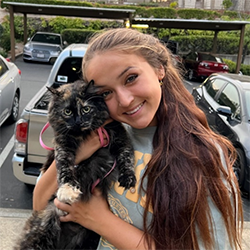A Student's Experience with High School Dissection
By Katharine Hampton, Chapman University Student
Hello. My name is Katharine Hampton. I graduated from Oak Ridge High School in California in 2022 and am a sophomore at Chapman University. I’m here today to discuss my first-hand high school experience of being confronted with dissecting dead animals.
I thoroughly enjoyed high school: I was on the women’s water polo team all four years, an honor student, and fortunate enough to be an Academic All-American. Most days blurred together, but some stood out, particularly one during my senior year.
Like most high school students, I took a course called Human Physiology. I knew it entailed learning about the human body and that I might see images that made me uncomfortable. I was also aware that dissecting an animal carcass was part of the curriculum. Some high schools require their students to dissect rabbits, guinea pigs, rats, minks, birds, turtles, or snakes. My class was expected to dissect cats. As someone who loves animals, I knew that I would request a humane alternative instead.
When my teacher described the dissection lesson she had in store for us, I cringed. When she mentioned that one of the cats would be pregnant—and that the group who received the pregnant cat would be “lucky”—my jaw was on the floor. But I wasn’t worried because I knew I would do an alternate assignment.
After class, I stayed behind and talked to my teacher. I explained that I would sincerely prefer not to participate in the cat dissection and would like an alternate assignment that didn’t involve dead animals. She looked almost amused by my request, smiled, and said something like, “Oh, don’t worry, it’s not that bad. You should just do it.” Her response shocked me because I knew my request was reasonable. After a minute or two of listening to her explain why I should “just do it,” I told her that I was vegan—as if my request and my feelings weren’t already a valid justification for not wanting to cut open a once-living, intelligent, sentient being—and that I didn’t think I could mentally or physically bring myself to participate. But even being vegan didn’t appear to be a good enough reason for her. I left feeling helpless and panicked that I would have to participate in the dissection to avoid failing the lesson. This project was one of our more critical assignments of the year, so I knew getting an F would have a negative impact on my overall grade. In high school, nothing is more important than grades, so I was, to say the least, horrified. I brought the issue up with her one or two more times and received the same response every time.
Although I was upset with my teacher and the school for forcing me into this dilemma, I also felt sympathy for her. She had been doing her job every year for decades, so she was probably desensitized to the uncomfortable parts of her class, and she probably didn’t know where animals to be dissected came from. But I did. As a vegan and an animal rights activist, I knew about the suffering and cruelty involved. I knew that some dissectors got animals from Craigslist or eBay for free or very cheap. I knew that some animals came from breeding facilities. I knew that others were caught in their natural homes and killed. I also knew that some were stolen or abandoned companion animals. I couldn’t, in good conscience, support the animal dissection industry by participating in this immoral and unnecessary class activity.
By the time the cat dissection came around, I had, for other reasons, switched to online classes, so my dilemma in Human Physiology was over. I don’t know what would have happened if I had stayed in that class. I probably would have addressed the problem with the principal if my teacher hadn’t given me an alternate assignment, and if that hadn’t solved the problem, I would have just taken a failing grade. But I still had friends in the class who described what they had witnessed on dissection day.
One friend recounted many horrifying details. She remembered the teacher saying horrible things like “These are just street cats. They were going to be killed anyway.” She also clearly remembered that once the dissection process had started, the teacher had everyone gather around the pregnant cat to watch as the kitten fetuses were extracted from their mother’s cold, lifeless body, as if it were some really cool thing. Some students had to step outside because they couldn’t handle being in the room while all this was happening. My friend witnessed her classmates playing with the cats’ corpses. Some even said they wished they could take a dead cat’s body parts home—especially the head.
One of the most disappointing parts of this experience was that the teacher didn’t offer anyone an alternate assignment. Instead, she allowed students to be mentally and physically upset to earn a passing grade. Although I fought for my right to be excused from this awful project, my friend didn’t even know that should have been an option. If she had been offered an alternate assignment, she would most certainly have chosen it, and I’m sure many other students would have, too.
The message I want to deliver right now is that this upsetting experience of feeling sick with worry, sadness, and panic could have been completely avoided if there had been no dissection of a real animal. There are numerous other ways to learn about anatomy without pressuring students to cut open a cadaver that might even look similar to their living animal companions..
To quote PETA, “Studies show that students who use non-animal methods perform as well as, if not better than, peers who dissect animals, according to a newly published study co-authored by PETA and published in The American Biology Teacher, a leading, peer-reviewed science-education journal.”
The objective of high school dissection is to learn about internal organs and their functions. This can be done using synthetic animals, digital programs, videos, and more. Students can acquire the same educational experience through these humane methods without the trauma and anxiety. If my school’s course in human physiology had provided humane methods of dissection, I would have been excited and curious rather than panicked and saddened.
Now that I’m a couple of years past this experience, I realize that it was not only unfair of the teacher to attempt to pressure me into this assignment but also utterly disgusting. I was simply a senior in high school trying to graduate with a good GPA, so I would have done almost anything a teacher told me to. The one thing I wouldn’t do was to participate in a system that uses sentient beings as if they were disposable equipment. Today I’m asking that the people in charge of educating my generation and the generations to come not make students choose between a good grade and a clear conscience






